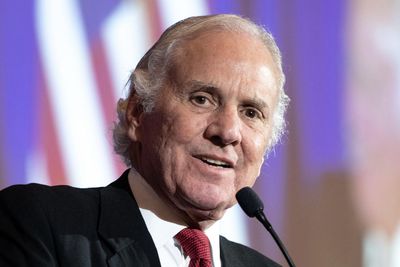
07 May 2021
TRENDING
COLUMBIA, S.C.
Gov. Henry McMaster is ordering the state's Department of Employment and Workforce to withdraw from the federal government's federal pandemic unemployment programs.
Starting on June 30, the state will no longer participate in the expanded unemployment benefits put in place because of the COVID-19 pandemic.
"South Carolina's businesses have borne the brunt of the financial impact of the COVID-19 pandemic. Those businesses that have survived — both large and small, and including those in the hospitality, tourism, manufacturing, and healthcare sectors — now face an unprecedented labor shortage," McMaster wrote in a letter to DEW Executive Director Dan Ellzy.
South Carolina's unemployment rate reached 12.8% in April of last year. In March, the unemployment rate was down to 5.1%, below the national rate of 6%.
McMaster said South Carolina has more than 81,000 available job openings as the economy has reopened and as restrictions have been lifted and the COVID-19 vaccine is being distributed.
"While the federal funds supported our unemployed workers during the peak of COVID-19, we fully agree that reemployment is the best recovery plan for South Carolinians and the economic health of the state," Ellzey said.
The pandemic led to a slowdown of the economy and higher unemployment rates. In order to assist people, the federal government expanded unemployment benefits. When the federal program started early in the pandemic, the benefit was initially $600 a week, given in addition to the state unemployment benefit.
The federal benefit was reduced to an additional $300 a week for those on unemployment, and the American Rescue Plan, signed by President Joe Biden in March continues the federal $300-a-week unemployment benefit until Sept. 6.
However, the expansion led to criticism that some people would make more while on unemployment than while they worked.
"What was intended to be a short-term financial assistance for the vulnerable and displaced during the height of the pandemic has turned into a dangerous federal entitlement, incentivizing and paying workers to stay at home rather than encouraging them to return to the workplace," McMaster wrote.
On Tuesday, Montana's Republican Gov. Greg Gianforte also announced plans for his state to withdraw from the federal program.Sue Berkowitz, the director of the S.C. Appleseed Legal Justice Center, said she was disappointed in McMaster's decision.
People may not work because the job they're qualified for has yet to reopen, they have small children and can't find day care, or they're caring for somebody who cannot be exposed to COVID-19, Berkowitz said."
Most people do want to go to work if it's possible and to just arbitrarily do this as if it's a punishment is just the wrong message to send to hardworking South Carolinians who are trying to do the best they can and should not be treated like they're children or they're cattle," Berkowitz said. "They just may have reasons they cannot go back to work right now."
South Carolina is participating in six federal pandemic related programs, including one to help people who are self-employed, underemployed or who are independent contractors but unable to work because of COVID-19, and another to give people on unemployment an additional 51 weeks of benefits beyond the traditional 20-week benefit.
Among the programs McMaster is ending the state's participation in is the Emergency Unemployment Relief for Governmental Entities and Nonprofit Organizations, where the federal government helps reimburse the unemployment insurance trust fund for benefits paid to people who worked for governmental entities or nonprofits.
McMaster also is reinstating a one week waiting period for people to receive unemployment benefits. Following McMaster's waiving of that waiting period, the state paid out $88.7 million in benefits between May 2020 and the end of March. However, unemployment insurance claims have dropped and the state is averaging $400,000 per week in first week reimbursements from the federal government, according to DEW.
In the week that ended on May 1, 108,296 South Carolinians received unemployment assistance. The federal pandemic unemployment programs McMaster has withdrawn the state from are:
▪ Pandemic Unemployment Assistance: 37,284 people for a weekly cost of $6.2 million.
▪ Pandemic Emergency Unemployment Compensation (PEUC): 56,318 people for a weekly cost of $14.6 million. However, about 9,300 PEUC recipients can move to regular unemployment insurance compensation.
▪ Federal Pandemic Unemployment Compensation (EPUC): 108,483 people for a weekly cost of $37 million.
▪ Mixed Earners Unemployment Compensation (MEUC): 21 people for a weekly cost of $34,400.
▪ Emergency Unemployment Relief for Governmental Entities and Nonprofit Organizations
▪ Federal Funding of the first week of Compensable Regular Unemployment for States with No Waiting Week
Source: S.C. Department of Employment and Workforce
JOSEPH BUSTOS, The State, May 6, 2021
Bustos is a state government and politics reporter at The State. He a Northwestern University graduate and previously worked in Illinois covering government and politics. He has won reporting awards in both Illinois and Missouri. He moved to South Carolina in November 2019.
###
May 7, 2021
Voices4America Post Script. Gov of SC says $300/wk unemployment benefits is enough to stop people from working. Are SC employers offering less than that? That's $7.50/hr on a 40 hr.wkly basis. $15,600 annually.
$26,200/yr is the poverty line. 13.8% of SC folks live below that.
Could you? Why don’t Republicans have ❤️?
#BeKindAmerica #EndPoverty #LivingWage